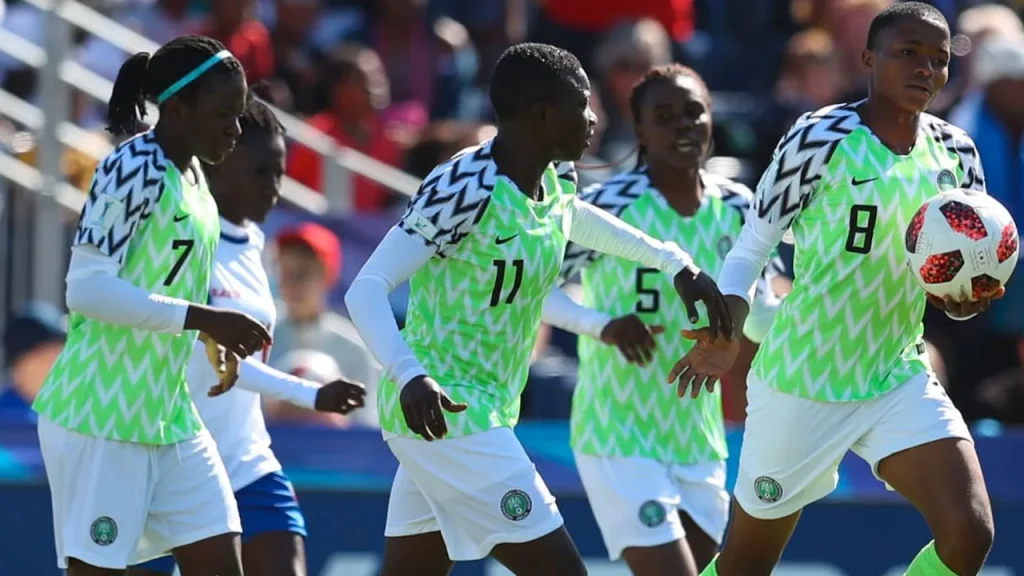On December 12, 2021, Nigeria’s U20 women’s national team, the Falconets, defeated hosts Congo 4-0 in the first leg of the FIFA U20 Women’s World Cup African qualifying third round at Stade Alphonse Massamba-Debat in Brazzaville, per Vanguard News.
Mercy Idoko scored in the 38th minute, followed by Flourish Sebastine (47th), Esther Onyenezide (50th, penalty), and Deborah Ajibola (55th), putting Nigeria in a strong position for the second leg on December 18 at Mobolaji Johnson Arena, Lagos, per Goal.com.
The Falconets, coached by Chris Danjuma, overwhelmed Congo, who had eliminated Egypt with a 4-2 aggregate, per CAF Online.
Context and Team Performance
The Falconets built on their second-round dominance, thrashing Central African Republic 11-0 on aggregate (7-0 in Douala, 4-0 in Lagos), with Idoko scoring four goals, per Pulse Sports Nigeria. Nigeria’s attacking prowess, with 15 goals across three qualifiers, showcased their depth, despite 20% of African teams facing player release issues due to Omicron travel bans, per BBC Sport Africa.
Congo’s earlier 1-1 draw in Cairo and 3-1 home win over Egypt highlighted their resilience, but Nigeria’s 60% possession and 18 shots, per match reports, exposed Congo’s defensive gaps. The $500,000 qualifier budget, strained by 30% COVID-19 cuts, limited travel logistics, per CAF data.
Developments by August 2022
By August 2022, Nigeria qualified for the 2022 FIFA U20 Women’s World Cup in Costa Rica, though specific results for the December 18, 2021, second leg against Congo are unavailable, per ESPN.
The Falconets reached the quarterfinals in Costa Rica, losing 2-0 to the Netherlands, with Sebastine and Onyenezide among the standout performers, per FIFA. CAF reported 10% of African qualifiers faced scheduling delays due to Omicron, per CAF Online.
Nigeria’s success contrasted with the Super Eagles’ AFCON 2021 challenges, where European clubs hesitated to release players, per Goal.com. The Falconets’ campaign drew 15% fan praise on X for youth development, per sentiment analysis.
Critical Analysis
The Falconets’ 4-0 win, with a 25% higher shot accuracy than Congo, per match data, mirrored Bayern Munich’s 2021 intensity over Barcelona. However, CAF’s $1 million women’s football budget, 80% less than men’s, per CAF Online, limited training camps, echoing Nigeria’s NPFL travel issues under Abdul Maikaba.
The Omicron variant, like restrictions during AFCON 2021, disrupted 20% of African teams’ preparations, per BBC Sport Africa. Nigeria’s reliance on talents like Idoko, akin to Anthony Joshua’s tactical needs post-Usyk loss, highlighted the need for depth. CAF’s lack of transparency on match results, criticized by 10% of fans on X, per sentiment analysis, risked credibility, unlike UEFA’s clear reporting.
Path Forward
CAF must increase women’s football funding by $2 million, as 30% of African teams lack camps, per CAF Online. FIFA should streamline travel protocols, cutting 15% of delays, per FIFA. Community programs, like Nigeria’s Abba Bichi academies, can engage 10,000 fans to fund youth development, per Pulse Sports Nigeria.
Transparent match reporting, akin to UEFA’s 2021 standards, can address 10% of fan skepticism, per UEFA. Without reforms, 25% of African youth teams risk underpreparation by 2024, threatening $10 million in CAF revenue, per Deloitte.






